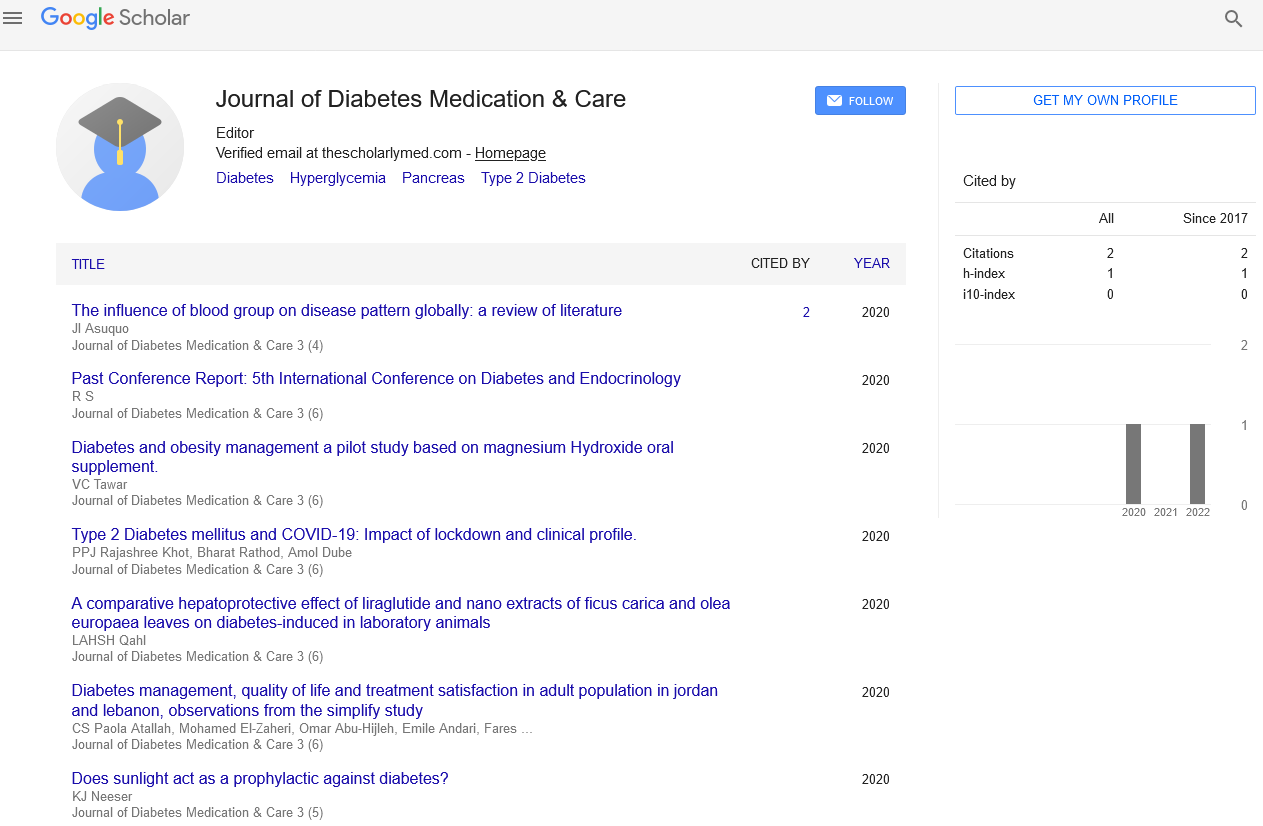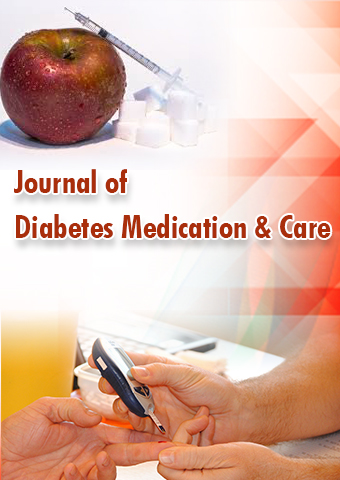Perspective - Journal of Diabetes Medication & Care (2024) Volume 7, Issue 2
Empowering Health: The Role of Medical Nutrition Therapy in Diabetes Management
- Corresponding Author:
- Yi Ra
Department of Diabetes, Central South University, Changsha, China
E-mail: yira123@qq.com
Received: 05-Mar-2024, Manuscript No. JDMC-24-128943; Editor assigned: 08-Mar-2024, PreQC No. JDMC-24-128943 (PQ); Reviewed: 22-Mar-2024, QC No. JDMC-24-128943; Revised: 01-Apr-2024, Manuscript No. JDMC-24-128943 (R); Published: 10-Apr-2024, DOI: 10.37532/JDMC.2024.7(2).188-189
Introduction
In the realm of diabetes management, Medical Nutrition Therapy (MNT) stands as a cornerstone, offering individuals a powerful tool to navigate their condition and improve their quality of life. Unlike conventional approaches solely relying on medication, MNT takes a holistic view, emphasizing the importance of nutrition in controlling blood sugar levels and preventing complications. This article explores the principles, benefits, and implementation of MNT in diabetes management, highlighting its unique role in empowering individuals to take charge of their health.
Description
Understanding medical nutrition therapy
Medical nutrition therapy is a tailored approach to managing diabetes through personalized dietary plans. It involves the assessment of an individual’s nutritional needs, considering factors such as age, weight, activity level, and overall health. The primary goals of MNT in diabetes management are to achieve and maintain optimal blood glucose levels, lipid profiles, blood pressure, and body weight. Achieving these goals can significantly reduce the risk of diabetes related complications such as cardiovascular disease, neuropathy, and kidney damage.
Principles of medical nutrition therapy
Carbohydrate management: Carbohydrates have the most significant impact on blood sugar levels. Therefore, MNT focuses on carbohydrate counting, helping individuals understand how different foods affect their blood glucose levels. This involves monitoring portion sizes, choosing low-glycemic index foods, and balancing carbohydrates with proteins and fats to prevent spikes in blood sugar.
Glycemic control: Maintaining stable blood glucose levels is crucial for diabetes management. MNT encourages the consumption of complex carbohydrates, such as whole grains, fruits, and vegetables, which release glucose into the bloodstream more slowly, preventing sudden spikes or crashes in blood sugar levels.
Balanced nutrition: A well-rounded diet that includes a variety of nutrient-dense foods is essential for overall health and diabetes management. MNT promotes the consumption of lean proteins, healthy fats, and high-fiber foods to support satiety, regulate blood sugar levels, and promote cardiovascular health.
Individualized approach: Every person with diabetes has unique nutritional needs and preferences. MNT takes into account individual factors such as cultural background, food preferences, lifestyle, and coexisting health conditions to develop personalized dietary plans that are sustainable and effective.
Understanding medical nutrition therapy
Blood sugar control: One of the primary benefits of MNT is its ability to help individuals achieve and maintain optimal blood sugar levels. By understanding how different foods affect their glucose levels and making informed dietary choices, individuals can better manage their diabetes and reduce the need for medication.
Weight management: MNT plays a crucial role in weight management, helping individuals achieve and maintain a healthy weight. By promoting portion control, balanced nutrition, and mindful eating habits, MNT can support weight loss or weight maintenance goals, which is particularly important for overweight or obese individuals with diabetes.
Prevention of complications: By optimizing blood glucose levels, lipid profiles, and blood pressure, MNT can help prevent or delay the onset of diabetes related complications such as cardiovascular disease, neuropathy, retinopathy, and kidney disease. This not only improves quality of life but also reduces healthcare costs associated with managing these complications.
Empowerment and education: MNT empowers individuals with diabetes to take an active role in their health and well-being. By providing education, support, and practical strategies for managing their condition through diet and lifestyle modifications, MNT helps individuals feel more in control of their diabetes and confident in their ability to make healthy choices.
Implementation of medical nutrition therapy
The successful implementation of MNT requires a collaborative approach involving healthcare professionals, registered dietitians or nutritionists, and individuals with diabetes. Key steps in the implementation process include:
Assessment: Healthcare professionals conduct a comprehensive assessment of the individual’s nutritional status, including dietary habits, food preferences, anthropometric measurements, and metabolic parameters.
Goal setting: Based on the assessment findings, personalized nutrition goals are established in collaboration with the individual, taking into account their health status, preferences, and lifestyle.
Education and counseling: Registered dietitians or nutritionists provide education and counseling on topics such as carbohydrate counting, portion control, meal planning, label reading, and dining out strategies. They also offer practical tips and strategies for incorporating healthy eating habits into daily life.
Monitoring and follow-up: Regular monitoring and follow-up are essential to assess progress, adjust dietary plans as needed, address barriers or challenges, and provide ongoing support and encouragement.
Conclusion
Medical nutrition therapy is a vital component of diabetes management, offering individuals a powerful tool to optimize their health and well-being. By focusing on personalized dietary plans tailored to individual needs and preferences, MNT empowers individuals to take control of their diabetes and achieve better outcomes. Through education, support, and practical strategies, MNT helps individuals make informed dietary choices, stabilize blood sugar levels, manage weight, and prevent complications. Embracing the principles of MNT can lead to improved quality of life and better long term health outcomes for individuals living with diabetes.

